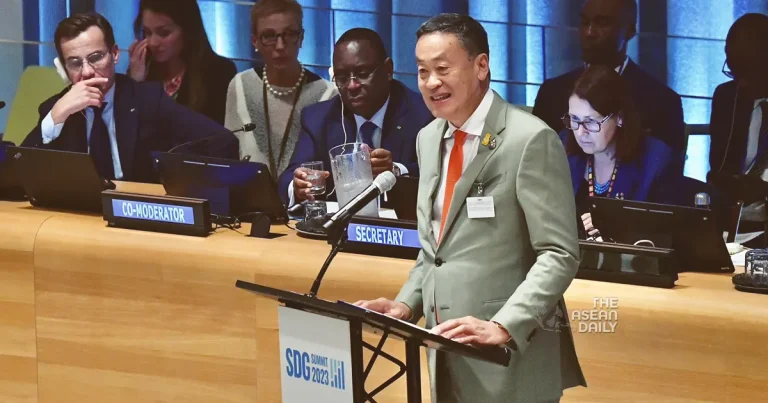3-10-2023 (BANGKOK) Prime Minister Srettha Thavisin delivered a comprehensive policy statement on Monday, outlining the government’s ambitious plans to elevate Thailand’s economic status to that of an upper-income country within the next four years. In his address, Thavisin emphasized the goal of achieving an average annual economic growth rate of 5% and raising the minimum daily wage to 600 baht by 2027.
As a first step towards this transformation, the government intends to increase the minimum wage to 400 baht per day. Additionally, it plans to set the monthly salary for university graduates holding a bachelor’s degree at 25,000 baht. These adjustments are expected to facilitate the country’s transition towards becoming an upper-income nation, enabling the government to generate higher tax revenues for further investment.
Thavisin acknowledged that the government’s emergence coincided with numerous challenges, both economic and social, exacerbated by the ongoing Covid-19 pandemic. The pandemic has exposed and exacerbated existing social disparities and inequalities within the country.
Recognizing the need for collaborative action, Thailand has made a commitment at the United Nations to work with other nations in addressing these pressing issues.
Thavisin highlighted the impact of geopolitical conflicts on the global supply chain, which has had repercussions on Thailand’s manufacturing sector. The country’s manufacturing activities have traditionally been concentrated in a limited number of product categories and export markets, making it susceptible to disruptions. Moreover, Thailand is bracing itself for the El Niño phenomenon, which is expected to adversely affect approximately 20 million farmer households. Though various governments have provided debt suspension programs, farmers continue to struggle with mounting debt burdens.
To address this issue sustainably, the government aims to promote financial discipline among households, enhance production efficiency, foster partnerships with agricultural networks along the value chain, and drive agricultural innovation towards high-value products. These measures are intended to increase the value of agricultural goods, thereby generating stable and sustainable income for farmers.
The country’s rapidly ageing population presents an additional set of challenges and risks, with implications for economic growth, fiscal balances, and healthcare.
In the short term, the government will prioritize income growth, expenditure reduction, and infrastructure investment.
The government’s flagship economic stimulus initiatives, notably the 10,000-baht digital subsidy program, will stimulate both demand and supply, resulting in increased circulation of money within the economy and contributing to GDP growth. These measures aim to invigorate local economies and prevent income over-concentration in urban areas. The digital subsidy program will be valid for six months, and it is anticipated that its multiplier effect will revive the economy and enhance people’s income.
In the realm of tourism, the government plans to implement visa-free measures similar to those established with China and Kazakhstan. Additionally, efforts will be expedited to develop new tourist attractions.
With regard to the cost of living, the cabinet has already approved resolutions to reduce energy expenses, including diesel prices to 30 baht per liter and power tariffs to 3.99 baht per unit. Plans are also underway to reduce costs related to cooking gas and benzene. Furthermore, the government has endorsed a debt suspension scheme for 2.7 million small-scale farmers.
In addition to debt relief, the government will actively promote agricultural innovation to boost farmers’ income, such as by reducing fertilizer costs through formula adjustments.
Furthermore, the government aims to support and facilitate the development of special economic zones, particularly those focusing on advanced technology industries. To achieve this, an equity matching fund will be established in collaboration with the private sector, with the ultimate goal of attaining unicorn status.
In terms of infrastructure investment, the government has outlined plans to construct additional airports to bolster tourism in secondary cities and establish railway connections with China. Notably, the cost of traveling on the new electric train system is set at a flat rate of 20 baht for the entire line. However, the Transport Ministry will require six months to gather information from operating partners before commencing negotiations to cap fares for all electric trains at 20 baht.




